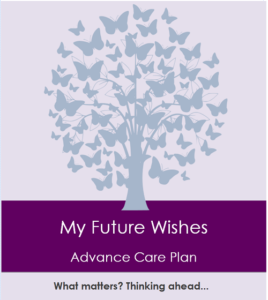Why we should all be thinking about Advance Care Planning
Posted: 17th June 2020
 Working with the Clinical Network – Dementia and Older People’s Mental Health & the West Yorkshire and Harrogate Health and Care Partnership the Yorkshire and Humber Patient Safety Collaborative has been working on a project to understand what we can do to improve the uptake of Advance Care Planning (ACP)
Working with the Clinical Network – Dementia and Older People’s Mental Health & the West Yorkshire and Harrogate Health and Care Partnership the Yorkshire and Humber Patient Safety Collaborative has been working on a project to understand what we can do to improve the uptake of Advance Care Planning (ACP)
Everyone needs to think and talk about death. It’s the only thing we know is definitely going to happen to all of us.
Recording wishes in an ACP allows us to express who we are and what is important to us. This helps ensure that wishes are taken into consideration when decisions are being made about future care especially if you cannot make the decision yourself.
We know that a high proportion of people living with dementia who are admitted to hospital have never had their future care wishes captured; it is especially important for people with this diagnosis as conversations need to happen while they still able to communicate and have capacity to make informed decisions.
Traditionally, Advance Care Planning has been seen as a healthcare role, with a particular emphasis on GPs having these conversations but this is not always possible or preferable to talking to other people involved in delivering care who may know the person better. We wanted to explore this by working with multiple partner agencies from health & social care, voluntary bodies, and with people affected by dementia (including informal carers) to truly understand the barriers that stop ACPs from being completed. To do this we used the Achieving Behaviour Change toolkit which highlighted some key issues and generated some solutions such as:
- A standard ACP document that all can access and use (My Future Wishes – Advance Care Plan)
- Support for people in how to hold ACP conversations
- Training for key colleagues to increase their knowledge and confidence across health and social care.
Mel Johnson, Programme Manager for the Yorkshire & Humber Patient Safety Collaborative said:
“This has been an inspiring project, there are some important barriers highlighted and innovative ideas to overcome them; helping colleagues feel comfortable in holding these conversations and empowering the public to ask for our help is the key”
Next steps include promoting the need for increased advance care planning and sharing the tools developed to help across the region.
For more information please email info@yhahsn.com
